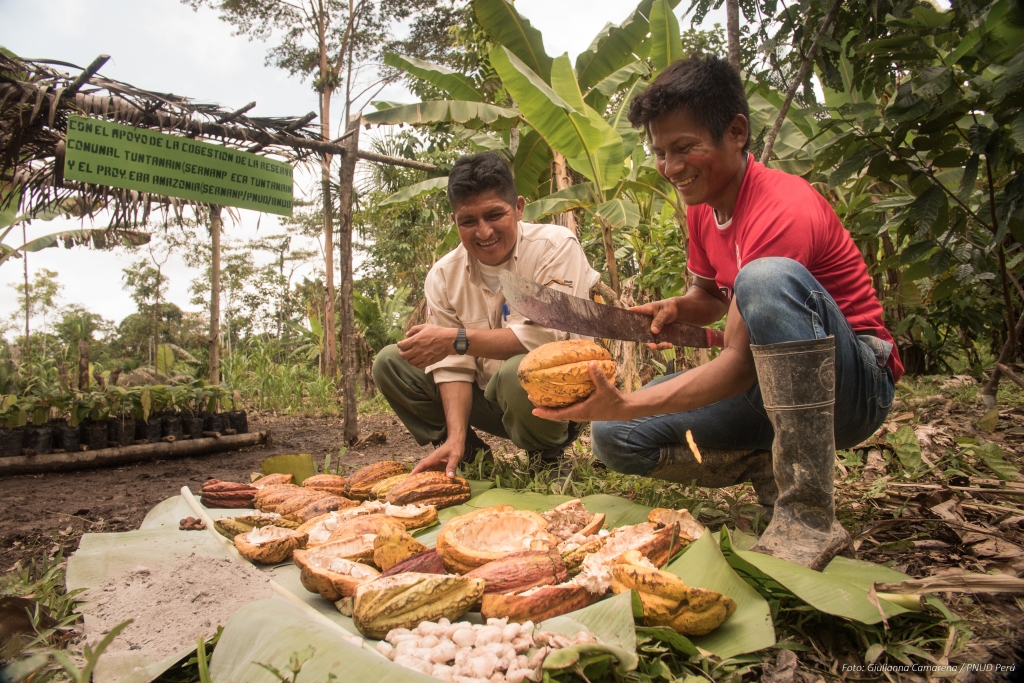Generating Evidence to Foster Nature-Based Solutions in Peru

The report provides empirical evidence for NbS in the Peruvian context and offers policy recommendations that prioritize investments in resilient and sustainable economies. The launch event attracted a diverse audience, including policymakers from the Peruvian Government and practitioners affiliated with prominent local and international NGOs. This confluence of stakeholders’ perspectives underscores the report’s relevance and potential to shape policies for NbS in the country.
About the Report:
In December 2023, The Mountain Institute, our partner in Peru, introduced a comprehensive report titled “Nature-Based Solutions and their Socio-Economic Benefits for Peru” during a virtual event attended by over 100 participants. The report meticulously presents empirical findings on the efficacy of NbS in generating economic, social, and environmental advantages within the Peruvian context. This extensive study, conducted between 2021 and 2022, analyses nine case studies of NbS implemented at various scales, ranging from local to national initiatives and spanning diverse ecosystems such as high Andean Mountain, Tropical Rainforest, and Coastal Lomas.
The report highlights how NbS has emerged as a promising pathway towards sustainable development in the post-pandemic era. However, while countries in Latin America – including Peru – have recognized the potential of NbS, investments in this area remain low. One of the main reasons for this is the lack of evidence on how NbS projects can contribute to both short-term economic recovery and long-term local development, in addition to environmental and social co-benefits. Therefore, this study is significant for NbS in Peru as it contributes to closing the knowledge gap by providing evidence and recommendations to boost policies that prioritize NbS.
It presents evidence gathered from nine practical case studies, showcasing the socio-economic impacts of NbS at local, subnational, and national levels. It also includes a literature review, semi-structured interviews with NbS practitioners, and an analysis of grey literature. Importantly, between 2022-2023, key stakeholders and policymakers participated in several workshops and a participatory process of review and feedback. The report categorizes the impact of NbS across six dimensions, which include employment, income generation, local livelihoods, water and food security, social equity and inclusivity, climate change adaptation and mitigation, and disaster risk reduction.
NbS Promoting Local Economies
Among the NbS analysed, those conducted at a national scale, such as reforestation and the strengthening of water basins, have demonstrated significant potential to create temporary green jobs for local and vulnerable populations. For instance, the Sierra Azul program focused on water conservation and harvest, generated 290,400 workdays between 2017 and 2021, benefiting thousands of families in high Andean communities. Additionally, other types of NbS also created community volunteer work, based on local traditional knowledge and practices such as Ayni and Minka. While volunteers contribute without financial compensation, these instances highlight the presence of green job structures that could be scaled up if appropriate financial mechanisms were established to reward them.
The water conservation and harvest initiative implemented in micro-basins in the Cusco region increased water availability during dry seasons, facilitating the maintenance and recovery of natural grasslands, while also improving livelihoods related to livestock farming. Furthermore, agroforestry practices in the National Protected Area Cordillera Azul resulted in just about a 600% increase in cocoa production per year from 2018 to 2021, directly impacting income generation for local families. Moreover, NbS can bolster economic resilience. During the pandemic, families in Amazonian communities collaborated to establish cooperatives as part of the Ecosystem-based Adaptation (EbA) project. This joint effort has led to the creation of several ventures, including dried cocoa production, shiringa latex cultivation, and pisciculture. The success of this initiative can be attributed to the implementation of an ecosystem-based framework and communal principles.
Water and Food Security:
Water scarcity is a pressing concern in Peru, exacerbated by climate change-induced glacier retreat, shifting precipitation patterns, and extreme weather events. Strengthening water security in terms of quantity and quality enhances the resilience of local populations. The study found how local NbS projects using an Ecosystem-based Adaptation approach made a significant impact on improving water security. By recovering and adapting ancestral water management technologies and native grassland management, these initiatives have bolstered water availability and quality. Similarly, the Yanayacu indigenous community’s sustainable management of local fish resources highlights the vital role of NbS in enhancing food security. The conservation and sustainable use of fish resources by the fishermen’s cooperatives increased both short-migration and medium-migration fish species. This resulted in an increase in the availability and access to protein in the community.
Climate Change Adaptation & Mitigation:
The NbS with a focus on revitalizing ancestral water management technologies has not only enhanced water security but also bolstered the resilience of local populations to climate change impacts. The restoration of age-old dams and channels has significantly improved the availability, efficiency, and equitable distribution of water resources, catering to both household and agricultural needs. Additionally, in the realm of climate change mitigation, Peru has spearheaded initiatives like REDD+ with three out of the nation’s ten REDD+ projects situated within four National Protected Areas (ANP) encompassing over 2 million hectares of Amazonian Forest. These projects have effectively curbed deforestation, preventing the loss of approximately 97,000 hectares between 2008 and 2020, according to carbon certification standards.
The publication of this report marks a significant step forward. It offers compelling evidence that investing in Nature-based Solutions offers a unique opportunity to boost economic recovery, while simultaneously protecting the environment and promoting social equity. This highlights the importance of shaping policies at every level, urging decision-makers, investors, and communities alike to recognize the potential of NbS and commit to its implementation.
Full report available in Spanish
Other recent stories







